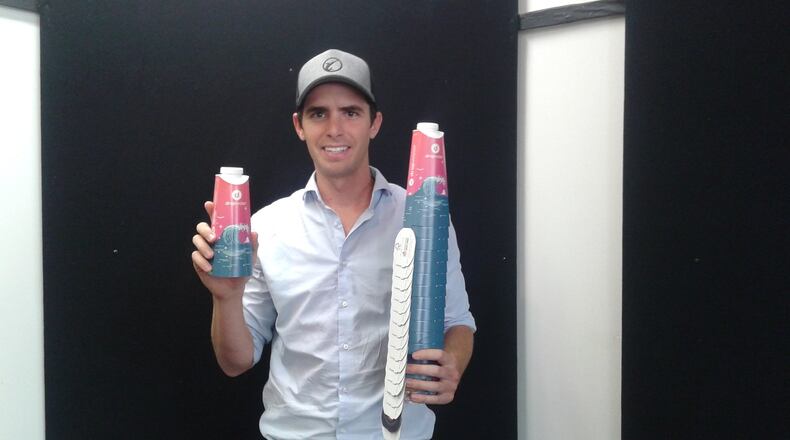But Edwards’ company, which recently participated in Hamilton’s Pipeline H2O program that helps develop water-technology businesses, plans to change that. The company has machines operating in only a few locations so far, but already is about to become profitable.
“We are reinventing how bottled drinks are manufactured and distributed, so they’re way more efficient and eco-friendly,” Edwards said. “We’re doing that with robots and eco-friendly materials.”
Rather than transporting water across the country or over oceans, Drop Water has dispensers that use local tap water that is piped into the machines. Within 10 seconds, a person using a machine can order and receive filtered water that is flavored (such as lemonade), heated or cooled, with added vitamins or caffeine if they like, that is dispensed in completely compostable containers.
“It may look like a vending machine, but it’s much more than that,” Edwards said during a recent presentation in Cincinnati’s Over-the-Rhine neighborhood. “This is a mini bottling plant.”
Rather than transporting tons of filled bottles, the company and its agents will only have to move the empty paper-based containers, which can be printed with advertising for organizations or companies using eco-friendly soy inks.
“You can actually fit more of our bottles in a Tesla (electric car) than traditional companies can fit in a 22-foot box truck,” Edwards said.
One advantage of the company’s service is, “Trucking around water is ridiculous,” he said. “We have water all around us. And we decided to eliminate that entire step.”
It’s ironic that Drop Water officials traveled from near California’s Silicon Valley to Hamilton to participate in Hamilton’s Pipeline program, because the area effort hopes to convert this region, with its many water-related utilities, companies and government agencies, into a “Silicon Valley of Water.”
WATER INNOVATION: Company that grew in Hamilton is saving lives around the world
The “bottles” can be sent through the mail. Not by accident, the company this year received a FedEx grant to help develop its products.
The company will be profitable with only six locations, including an airport, and those should be in operation this summer, Edwards said. The company will use the traditional vending model, under which 15-20 percent of revenues go to the location provider. Within the next 12 months, the company plans to serve about 100 locations around California’s Bay Area.
“I’m pretty sure we’re going to make an exception and bring machines to the Cincinnati area within a year, if you guys will let us,” said Edwards, who studied packaging at California Polytechnic State University.
About the Author
